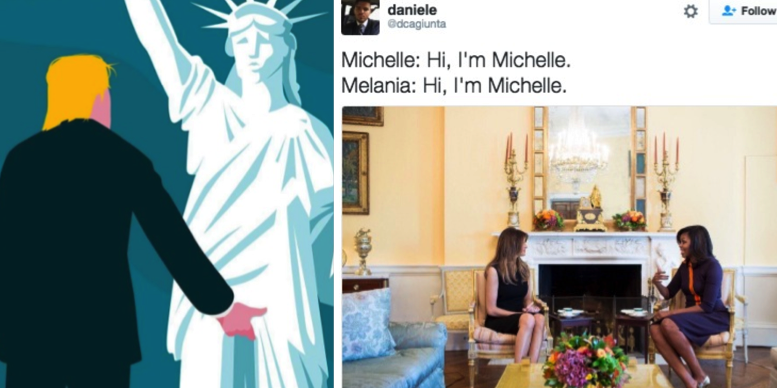
Amerikanska valet – glansdagar för memes
En smutsig och bisarr amerikansk valrörelse är över. Och till mångas stora förvåning valdes Donald Trump till president. För internets främsta meme-makare, som skapar virala succéer genom sina redigerade bilder och klipp, är det en guldålder. Flera medier har listat de bästa inläggen, du hittar dem här:

bakgrund
Internetfenomen
Wikipedia (sv)
Internetfenomen, även internetmeme eller internetmem efter engelskans meme (/ˈmiːm/), är fenomenet hur något från början okänt, till exempel olika typer av kortfilmer eller bilder, sprids via Internet och uppnår stor popularitet och igenkänning på kort tid bara genom just detta medium. Fenomenet förknippas främst med tiden från andra hälften av 1990-talet och framåt, då hemdatorer och Internet blivit en del av vardagen. Internetfenomen kopieras ofta av andra som gör sin egen version vilket blir en del av fenomenet. Som exempel på uppmärksammade internetfenomen kan nämnas filmen All your base are belong to us och skämtformatet Chuck Norris Facts.
Termen mem myntades av Richard Dawkins som kulturarvets minsta enhet, en hypotetisk analogi med genen inom genetiken.
bakgrund
Meme
Wikipedia (en)
A meme (/ˈmiːm/ MEEM) is "an idea, behavior, or style that spreads from person to person within a culture". A meme acts as a unit for carrying cultural ideas, symbols, or practices that can be transmitted from one mind to another through writing, speech, gestures, rituals, or other imitable phenomena with a mimicked theme. Supporters of the concept regard memes as cultural analogues to genes in that they self-replicate, mutate, and respond to selective pressures.
Proponents theorize that memes are a viral phenomenon that may evolve by natural selection in a manner analogous to that of biological evolution. Memes do this through the processes of variation, mutation, competition, and inheritance, each of which influences a meme's reproductive success. Memes spread through the behavior that they generate in their hosts. Memes that propagate less prolifically may become extinct, while others may survive, spread, and (for better or for worse) mutate. Memes that replicate most effectively enjoy more success, and some may replicate effectively even when they prove to be detrimental to the welfare of their hosts.
A field of study called memetics arose in the 1990s to explore the concepts and transmission of memes in terms of an evolutionary model. Criticism from a variety of fronts has challenged the notion that academic study can examine memes empirically. However, developments in neuroimaging may make empirical study possible. Some commentators in the social sciences question the idea that one can meaningfully categorize culture in terms of discrete units, and are especially critical of the biological nature of the theory's underpinnings. Others have argued that this use of the term is the result of a misunderstanding of the original proposal.
The word meme originated with Richard Dawkins' 1976 book The Selfish Gene. Dawkins's own position is somewhat ambiguous: he welcomed N. K. Humphrey's suggestion that "memes should be considered as living structures, not just metaphorically" and proposed to regard memes as "physically residing in the brain". Later, he argued that his original intentions, presumably before his approval of Humphrey's opinion, had been simpler. At the New Directors' Showcase 2013 in Cannes, Dawkins' opinion on memetics was deliberately ambiguous.
Omni är politiskt obundna och oberoende. Vi strävar efter att ge fler perspektiv på nyheterna. Har du frågor eller synpunkter kring vår rapportering? Kontakta redaktionen



